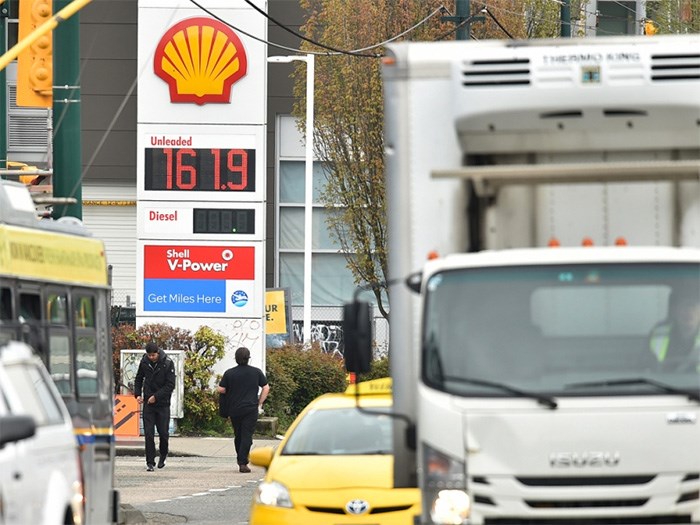 Gas prices reached new heights this week in Vancouver and around the province. Photo Dan Toulgoet
Gas prices reached new heights this week in Vancouver and around the province. Photo Dan Toulgoet
Gas prices soared to record heights in Vancouver this week, and the surge may not be ending anytime soon.
Prices reached as high as 161.9 cents per litre in Metro Vancouver as of Monday, April 30, while in Victoria drivers paid as much as 154.9 per litre to fill the tank.
On Haida Gwaii there were even reports of a whopping 173.3 cents per litre at local gas stations.
And with the summer months approaching, there looks to be little relief on the horizon for consumers.
Analysts, however, disagree on the root cause of the problem.
Dan McTeague, a senior petroleum analyst at the consumer advocacy site gasbuddy.com, says there are numerous factors contributing to the current rise in gas prices.
“[B.C. is] chronically short on gasoline,” said McTeague, adding that the province is currently relying on supply from either the Trans Mountain pipeline, a pair of Washington state refineries, or the Burnaby Parkland refinery, which recently reopened April 9.
Part of the problem, according to McTeague, is that the Washington refineries have been operating at a limited capacity for the past several months while they undergo maintenance.
He adds that this long-standing reliance on fuel from south of the border hurts B.C. not only when the supply refineries are affected, but also when U.S. oil companies find it more profitable to sell to other markets.
“One thing is very clear — demand in the United States is not slowing down even though prices have gone up,” McTeague said. “When Americans are not selling to themselves, their refiners are selling to Mexico. That is a cause for concern, because if we don’t buy it at their price, it’s likely that someone else will.”
McTeague argues that the only way for B.C. to alleviate its supply needs is to proceed with expansion of the Trans Mountain pipeline to boost the flow of oil into the province.
“The existing pipeline will go from sending, potentially, 80,000 barrels of fuel a day to 140,000. So that would be like building another refinery,” he said. “Getting this thing built will help Vancouver, Victoria and Vancouver Island, at least mitigate prices.”
Jonn Axsen, an associate professor in SFU’s department of Resource and Environmental Management, who teaches a class in ecological economics, disagrees with McTeague’s assessment.
Axsen says that the idea that expanding the Trans Mountain pipeline would lead to a drop in fuel prices doesn’t hold water. In fact, he says the opposite is true.
“There’s economic reasons why building the pipeline in the long run would actually increase prices,” Axsen said. “If Canadian producers can more easily access a global market, than they can make more money selling it globally. That puts pressure on the price domestically, so the prices will actually go up.”
@akurial
alexhk24@gmail.com


